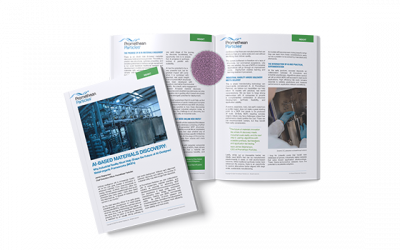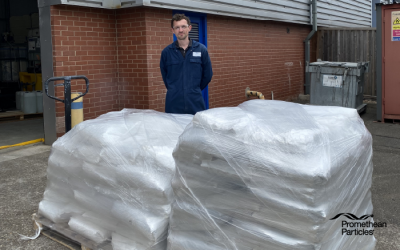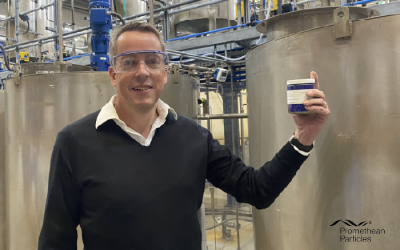The chief executive officer of Nottingham-based chemical manufacturer Promethean Particles has welcomed the decision to award this year’s Nobel Prize in Chemistry to the scientists who developed the advanced materials at the heart of the company’s work. James Stephenson described the award to Susumu Kitagawa, Richard Robson, and Omar M. Yaghi as “a landmark moment” which could help speed up efforts to tackle climate change.
The materials in question are metal-organic frameworks (MOFs), crystalline materials made up of metal ions linked by organic molecules. With more than 100,000 disfferent structures now reported, some are designed to ‘adsorb’ molecules – meaning to capture them on their surface – and act like a sponge to trap substances such as carbon dioxide, water, or gas.
Allied to this, and one of their most storied properties, MOFs have enormous surface areas, enabling them to adsorb vast quantities of molecules – so much, in fact, that just a teaspoon of MOF granules has the equivalent surface area of two tennis courts. Approximately 90% of the volume of a MOF can actually be open space.
The three scientists received their awards because of their pioneering work establishing a new foundation of advanced materials. The remarkable qualities offered by MOFs lead to utility in a number of critical applications, such as capturing the climate-warming carbon dioxide from the emissions produced by burning fossil fuels. They can also be used for a host of other applications, including water purification, and gas storage.
However, until recently, difficulties in manufacturing MOFs in large enough quantities for industrial applications have held the technology back. Promethean Particles has overcome this challenge with its unique production method and is now manufacturing MOFs on a world-leading scale.
James said:
“The pioneering work of Professors Susumu Kitagawa, Richard Robson and Omar Yaghi laid the foundations for a class of materials that have the potential to change the world, and so today’s award is richly deserved.
“Not only that, but the Nobel Committee’s decision will inspire a new wave of interest and investment. This is a landmark moment which proves that MOFs are no longer a laboratory curiosity but a platform technology with huge environmental, industrial, and economic benefits.
“At Promethean Particles, we’re focused on scaling up production so that these materials can make a measurable impact, and we are privileged to be helping MOFs take the next step towards achieving the potential that the professors always knew they were capable of.”




